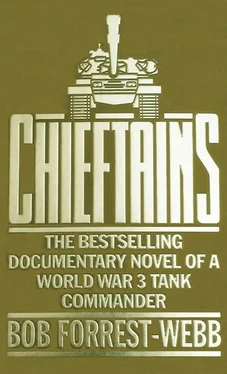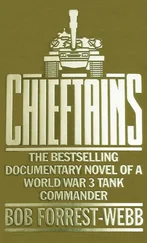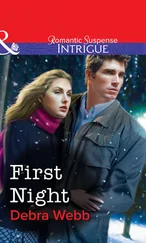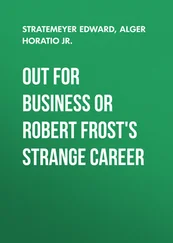Fellows had slowed the unit two hundred meters from the ruins of the small village of Almke when they came under fire. The first indication was the explosion of the second in line of the SAS APCs. In open ground a little to the rear of the Scimitars, it burst into flames, swerved to the left and overturned. Sandy Roxforth, in station sixty meters to the right of the APC, had been standing in his Scimitar with his head and shoulders out of the hatch. The attack was unexpected, accurate identification was difficult at night and Soviet troops would be taking care not to fire on their own armour.
Roxforth dropped into the vehicle and as he did so heard machine gun bullets rattling off the aluminium hull. The lieutenant had just sufficient time to realize its significance when a 120mm shell, its point-blank range confirmed by the ranging machine gun, penetrated the Scimitar hull just below the top run of the track and exploded directly behind the driver.
Sache-Worrel saw Roxforth’s tank destroyed. The way in which it blew to pieces was terrifying, and he realized instantly there was no possibility of survivors. He was praying for someone to break radio silence and tell him what he should do. It seemed sensible to use best speed to get out of the immediate area of the village and away into the darkness; at fifty miles an hour it didn’t take long to get a Scimitar out of trouble. But Captain Fellows, to Sache-Worrel’s right and eighty meters ahead of him, had not changed course and appeared to have stopped.
Sache-Worrel saw a burst of flame from Fellows’ Rarden; a single shot, then two in rapid succession. He was getting too close to Captain Fellows’ tank so ordered his driver to swing away further to the right and increase speed, intending to draw around in an arc beyond the leading Scimitar.
Fellows’ Rarden fired a three-round burst, then his Scimitar accelerated. The captain had left it a fraction of a second too late. A shell exploded beneath the tank’s square stern, lifted the hull upwards and threw it completely on to its side. It ignited immediately, its fuel spreading around it so it appeared to be floating in a lake of flames. Sache-Worrel caught a horrifying glimpse of a small dark figure staggering within the incinerating fire, then heard Gunion on the net, his voice urgent.
‘Magpie Sierra Echo… this is Ben… three o’clock, woods,… go like hell!’
‘Wilco…’ He felt the Scimitar surge across the ground as his driver swung it away.
‘Magpie Sierra Delta… this is X-Ray Nine… we’re going in to neutralize.’ It was Hinton.
‘Roger X-Ray Nine, we’ll stand off.’
The net was silent again for several minutes. Sache-Worrel brought the Scimitar around two thousand meters beyond the village, and waited.
‘Magpie Sierra Delta this is X-Ray Nine. It’s okay here now.’
‘Roger X-Ray Nine, out to you. Magpie Sierra Echo… white farm building four kilometers back… small lake… rendezvous there.’
‘Roger Magpie Sierra Delta.’
The HF died. Sache-Worrel was stunned by the happenings of the past few minutes. Half the SAS unit wiped out… and two Scimitar crews… Sandy Roxforth… Captain Fellows… all in seconds. A body thrashing in the petrol fire, Fellows’ or his gunner’s? There was no slow introduction to war and death, one moment it was peace and the next all hell had broken loose around you. And he had not even seen the enemy although he had kept his eyes to the L2A1… Fellows must have spotted them though, he had managed several shots with the Rarden.
McLeod the gunner shouted by Sache-Worrel’s right shoulder, ‘We hit the shit, sir… bloody shame!’
Hit the shit! That was understatement thought Sache-Worrel. Everything had gone wrong since the moment they left the bunker! He could see the farmhouse ahead of them now. Before when they had passed it the ruins had looked serene in the darkness, and the carp lake bordering its grounds had appeared calm and peaceful. Now he wasn’t sure; it might hold an enemy gun… death… nothing would be as it seemed for him ever again. At least, not in war.
Gunion had stayed with the remaining APC, and then escorted it back. The vehicle was now in the shadow beside the tumbled farm building, and the men were stationed in the rubble. The two Scimitars were parked in what had been the farm’s orchard and a carpet of apples covered the ground.
Hinton was angrily discussing the tragedy. ‘It was a Leopard! A bloody Heer Leopard. Hull-down in the wreckage of a supermarket.’
A Leopard! Good God, thought Sache-Worrel, we lost all our men to a NATO tank. Is war all mistakes? It was beginning to look like it.
‘You sure it was a NATO crew?’ asked Gunion. ‘It might have been captured!’
‘It should have been bloody captured,’ growled Hinton disgustedly. ‘It would have been better for us. I lost eleven men, good men… you’ve lost six… every one dead.’
‘Who were the Leopard crew?’
‘There was a 7th German Armoured Division flash on the back of the tank,’ said Hinton. ‘And what I could see of their equipment afterwards was all West German.’
‘What did they say when you told them we were British?’ asked Sache-Worrel.
‘I’m afraid we didn’t have time for a conversation. They were fighting with the commander’s hatch wedged partly open… we dropped them a message and shut the hatch.’
‘A message?’
‘A British ordinance mark on a grenade!’
The second transmission from HQ, due to be made at 02.23 hours, did not materialize. Again the men experienced the now familiar feelings of uncertainty. Had the radio message been transmitted an hour earlier than they had expected? Would it be transmitted an hour later? The message was supposed to give a new target for the unit. But even more important, it was a form of contact with their comrades. Gunion had decided against any further attempt to pursue the first target of the Soviet Division’s HQ, by now they would probably have been moved, and there was less than four hours until dawn. He didn’t want the last two Scimitars caught in the centre of the main Russian troop movements in broad daylight.
The SAS were free to operate as an independent unit after the first night, and Hinton had already explained his plans. He intended to abandon the APC and work on foot. Men were easier to conceal than vehicles, and he would travel for the remainder of darkness into the sector occupied by the Soviet logistics column and operate there. He had a potential rendezvous with a Bundesgrenzshutz unit in forty-eight hours, and would link up with them if they still existed. Supply points of additional weapons and explosives were already available to him when he needed them, and he would be organizing a guerrilla force.
Hinton could make it all sound so casual and easy, thought Sache-Worrel. The man was much harder than himself, brutal in his attitude even to friends, though there weren’t more than three of four years’ difference in their ages. Listening to him made Sache-Worrel feel like a new boy at prep’ school.
He realized now that everything he had ever done in his military training had only been a game. Of course it had been tough and essential… the best that could be given to the officers and men. But behind every training action was the knowledge that someone somewhere was giving the orders and knew what they were doing; within a very few hours you were always clean, warm, and ensconced back in the comfort of the mess with your friends, laughing over a few gin and tonics. And in the background were your families, girlfriends, wives, keeping the whole thing in perspective.
Ireland? It had felt dangerous at the time, but it had been a pushover; border patrols in the open countryside south of Armagh, and the faintly hostile attitude of the people, which you knew was seldom genuine but enforced by the IRA activity in the area. In resrospect, the former tour of duty seemed like a holiday.
Читать дальше












